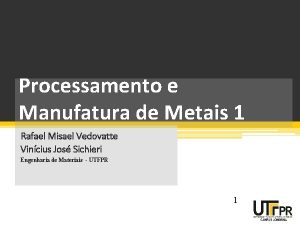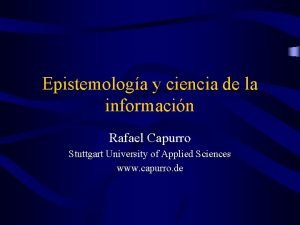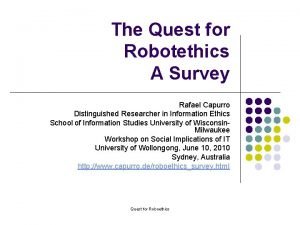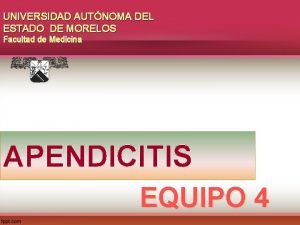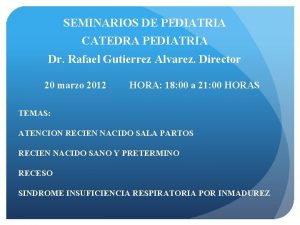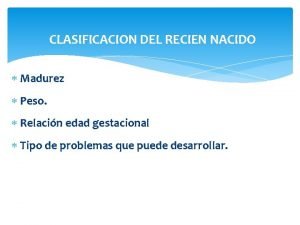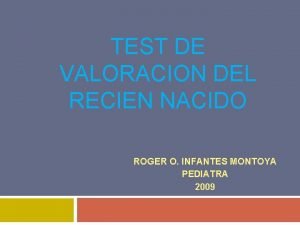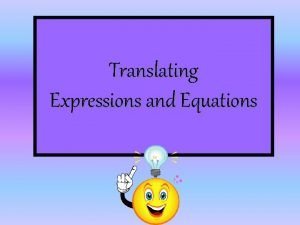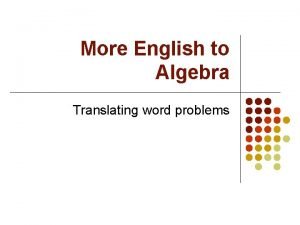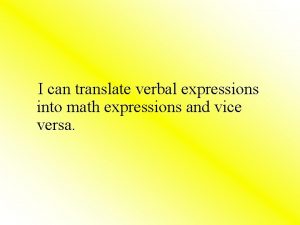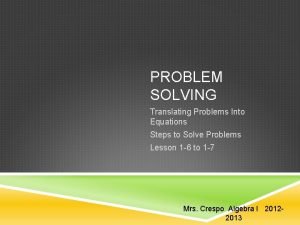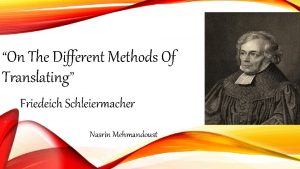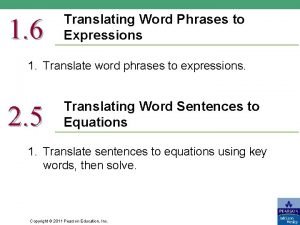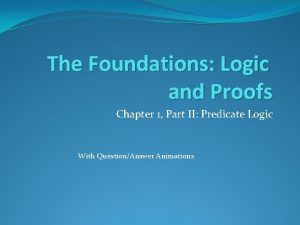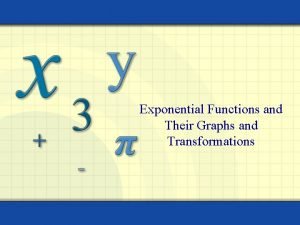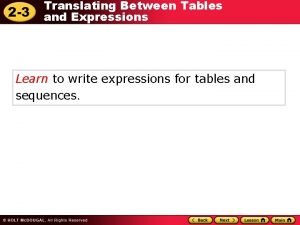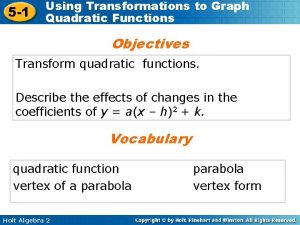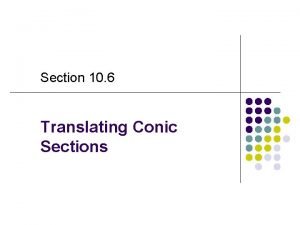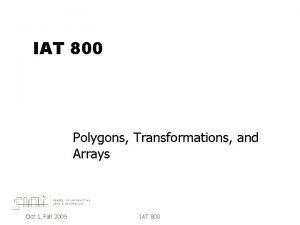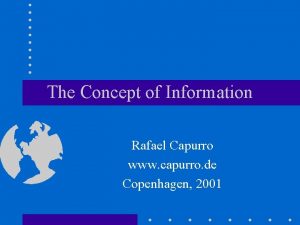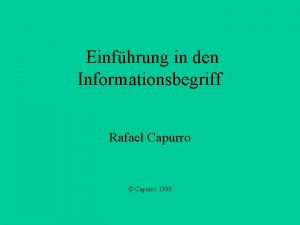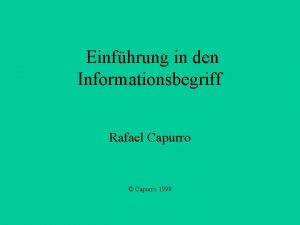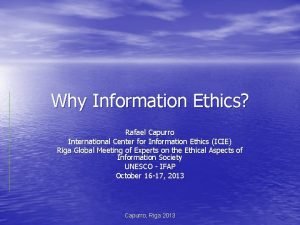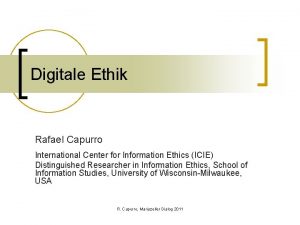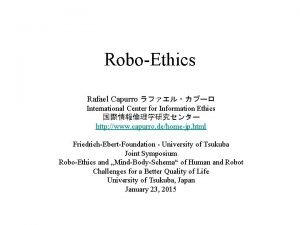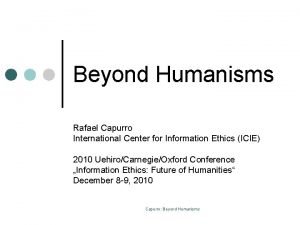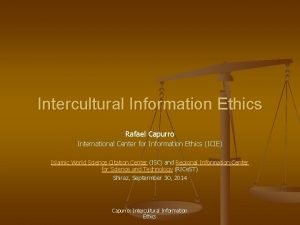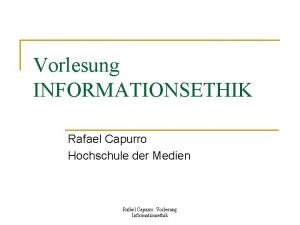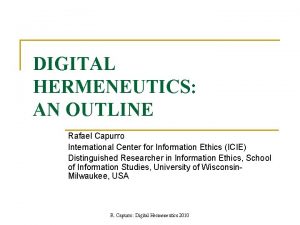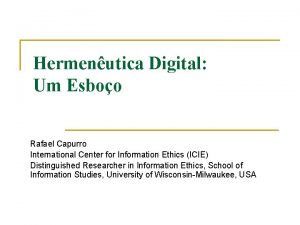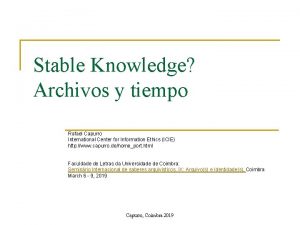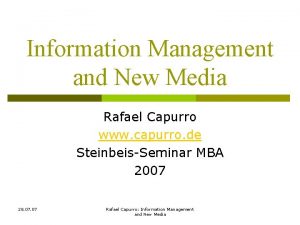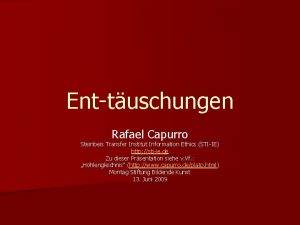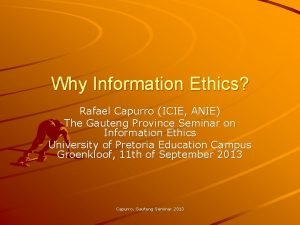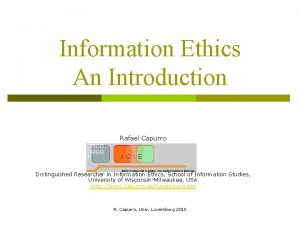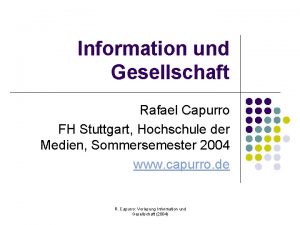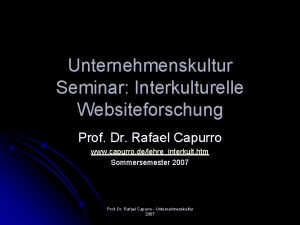Translating Information Rafael Capurro International Center for Information




















![Information as „hermeneutical as“ That is: hermeneia-1 hermeneia-2 hermeneia-3 [semainein]: [legein]: [apophainesthai]: self-expression Information as „hermeneutical as“ That is: hermeneia-1 hermeneia-2 hermeneia-3 [semainein]: [legein]: [apophainesthai]: self-expression](https://slidetodoc.com/presentation_image_h/18b92a3eafd3f20d19e1d8d8eaf21b4f/image-21.jpg)










![Conclusion I quote from http: //en. wikipedia. org/wiki/Mulla_Sadra "Mullā Sadrā [. . . ] Conclusion I quote from http: //en. wikipedia. org/wiki/Mulla_Sadra "Mullā Sadrā [. . . ]](https://slidetodoc.com/presentation_image_h/18b92a3eafd3f20d19e1d8d8eaf21b4f/image-32.jpg)








- Slides: 40

Translating Information Rafael Capurro International Center for Information Ethics (ICIE) FIS/ISIS 2015: Information Society at the Crossroads - Response and Responsibility of the Sciences of Information, Vienna University of Technology, June 5, 2015 Capurro: Translating Information

Translating Information Taṣawwur and taṣdīq in Averroes‘ Great Commentary of Aristotle‘s De anima, were translated into Latin by Michael Scot with (in)formatio and fides. The first concept addresses the representation of "indivisible things" (the "ideas") while the second concept means the predicative judgement (logos apophantikos) about things using the composition of names or signs where there is right and wrong. Capurro: Translating Information 2

Translating Information Informatio or just formatio or "conception" (Alain de Libera), as apposed to fides or "assentiment" (Alain de Libera) means the "thinking of the indivisible" or of the "simple objects of thought", the Greek term being: τῶν ἀδιαιρέτων νόησις. There is no single Greek term in Aristotle's De Anima corresponding to the Latin translation by Michael Scot of the Arabic term(s) used by Averroes in his Great Commentary quoted by Albertus Magnus. Capurro: Translating Information 3

Translating Information Albertus Magnus (1193 -1206) makes a short comment on the concept of informatio "apud Arabes" in the context of Aristotle's De anima and indirectly to Averroes, called „the Commentator“: Capurro: Translating Information 4

Translating Information "Indivisibilium quidem igitur, quae sunt incomplexa intelligentia sive intelligere, quod est actus intelligendi, in omnibus his est circa quae non est falsum, eo quod, sicut INFERIUS ostendemus, numquam accidit error intelligibilium in talium intellectu. Hic autem intellectus vocatur apud Arabes informatio, eo quod intelligere talia est informari intellectum possibilem naturis formalibus eorum. " Capurro: Translating Information 5

Translating Information Aristotle's νόησις or, more precisely, νόησις τῶν ἀδιαιρέτων, thinking the indivisibles, that was translated from Greek into Arabic with taṣawwur, from Arabic into Hebrew with ẓiyyur, and from Arabic into Latin with (in)formatio is an example of a complex history of translations of a Latin concept that has become paradigmatic for our age. Capurro: Translating Information 6

Translating Information Throughout the Middle Ages informatio and informo are commonly used in epistemological, ontological, and pedagogical contexts by several authors (see Capurro, 1978 for details). The Aristotelian influence on the higher-level philosophical concept of informatio is shown at best in the work of Thomas Aquinas (1225 -1274). Capurro: Translating Information 7

Translating Information Schütz (1958) distinguishes in his Thomas. Lexikon between informatio in the sense of "providing something with a form" in an epistemological or ontological context and the pedagogical sense of education or instruction. Capurro: Translating Information 8

Translating Information Probably the most intriguing question from the point of view of the history of ideas concerns the ontological use of informatio — both in the lowerlevel sense of "molding matter" as well as in the higher-level sense used by Scholastics as informatio materiae — which became obsolete not only in modern languages that, like English, inherited the Latin word and slightly transformed it into information, retaining the epistemological meaning, Capurro: Translating Information 9

Translating Information The modern uses of information show a transition period in which the medieval ontological concept of "molding matter" is not just abandoned but reshaped under empirical and epistemological premises. Capurro: Translating Information 10

Translating Information The action of 'informing' with some active or essential quality" had, according to the Oxford English Dictionary "a quite restrictive use" not only in English, but also in other modern European languages, and references on "formation or molding of the mind or character, training, instruction, teaching" date from the 14 th century. Capurro: Translating Information 11

Translating Information This transition from Middle Ages to Modernity in the use of the concept of information — from "giving a (substantial) form to matter" to "communicating something to someone" — can be detected in the natural philosophy of René Descartes (1596 -1650), Capurro: Translating Information 12

Translating Information who calls ideas the "forms of thought, " not in the sense that these are "pictured" ("depictae") in some part of the brain, but "as far as they inform the spirit itself oriented to this part of the brain" ("sed tantum quatenus mentem ipsam in allem cerebri partem conversam informant. " (Descartes 1996, VII, 161). Capurro: Translating Information 13

Translating Information but also, for instance, in German where the word Information was actually used in the sense of education and communication since the 15 th century. Informatio was literally translated — first in a mystical context as in-Bildunge or in. Formunge; later on in a general pedagogical sense, such as used by Christoph Martin Wieland (1733 -1813) — with Bildung, a term heavily charged with higher-level meaning (Capurro 1978, p. 176). Capurro: Translating Information 14

Translating Information A plausible explanation for the loss of the ontological higher-level sense is the decline of Scholastic philosophy caused by the rise of modern science. Capurro: Translating Information 15

Translating Information Nevertheless, the concept of information ceases to be a higher-level concept until the rise of information theory in the 20 th century. Philosophers such as Francis Bacon (15611626), John Locke (1632 -1704), George Berkeley (1685 -1753), David Hume (1711 -1776), and Thomas Reid (1711 -1796) criticize scholastic hylomorphism and particularly theory of abstraction. Capurro: Translating Information 16

Translating Information It is interesting to observe how the concept of information is closely connected to views of knowledge. This conclusion is important when we analyze the concept of information in information science, because it indicates a severly neglected connection between theories of information and theories of knowledge. Capurro: Translating Information 17

Information as „hermeneutical as“ The Aristotelian „thinking (of) the indivisible“(„νόησις τῶν ἀδιαιρέτων) (taṣawwur, (in-)formatio) that precedes the action of the intellect dealing with the composition in predication (taṣdīq, fides), can be translated into Heidegger's difference between the "hermeneutical as" and the „apophantic as“. Capurro: Translating Information 18

Information as „hermeneutical as“ The philosopher and theologian Thomas Sheehan writes in his "Hermeneia and Apophansis: The early Heidegger on Aristotle": "The noun hermeneia (or the verb hermeneuo) in Aristotle has a generic meaning and two specifications. Generically it means expression, manifestation, or communication (semainein). Capurro: Translating Information 19

Information as „hermeneutical as“ In increasingly determinate specification it can then mean: verbal semainein, called lexis or dialectos; and declarative verbal semainein, called apophansis or logos apophantikos. Capurro: Translating Information 20
![Information as hermeneutical as That is hermeneia1 hermeneia2 hermeneia3 semainein legein apophainesthai selfexpression Information as „hermeneutical as“ That is: hermeneia-1 hermeneia-2 hermeneia-3 [semainein]: [legein]: [apophainesthai]: self-expression](https://slidetodoc.com/presentation_image_h/18b92a3eafd3f20d19e1d8d8eaf21b4f/image-21.jpg)
Information as „hermeneutical as“ That is: hermeneia-1 hermeneia-2 hermeneia-3 [semainein]: [legein]: [apophainesthai]: self-expression or communication in any form; self-expression or communication in discourse; self-expression or communication in declarative sentences. Capurro: Translating Information 21

Information as „hermeneutical as“ To synthesize is to distinguish, and the assertoric synthesis-distinction (the "apophantic as" operative in hermeneia-3) rests on the prepredicative synthesisdistinction of entities and their practical essence; Capurro: Translating Information 22

Information as „hermeneutical as“ and for Heidegger that composition and division is performed on the basis of the original (i. e. the hermeneutical) as. This unified as-structure, rooted in praxis, that Heidegger retrieved from Aristotle's discussion of hermeneia led to the issues of transcendence and ultimately temporality. Capurro: Translating Information 23

Information as „hermeneutical as“ Heidegger interpreted human beings, insofar as they already know the beingness-dimension of entities, as transcendence, i. e. , as being already beyond entities and disclosive of the possibilities in terms of which entities can be understood. This kinetic exceeding of entities he called the human being's Immer-schon-vorweg-sein, his condition of being "always already ahead" of entities. Capurro: Translating Information 24

Information as „hermeneutical as“ This movement is the co-performance of disclosure in humanely primordial sense, and it corresponds to the diairesis-moment of the hermeneutical as. In the oral version of his course Die Grundbegriffe der Metaphysik (February 27, 1930) Heidegger said that diairesis, seen as human transcendence, "pulls us as under, as it [p. 80] were, and grants us a stretching-ahead, takes us away into the possible. . " Capurro: Translating Information 25

Information as „hermeneutical as“ But at the same time the human being returns from that transcendence to entities so as to know them in terms of possibility, i. e. , "so as to allow the possible - as what empowers the actual - to speak back to the actual in a binding way. . . , binding or bonding it: synthesis. " Capurro: Translating Information 26

Information as „hermeneutical as“ Clearly the unity of diairesis as transcendence to the essence of beings and synthesis as the return to beings in their essence points to the kinetic structure that grounds the hermeneutical as, just as the hermeneutical as in turn makes possible the truth and falsehood of Aristotle's hermeneia-3. " Capurro: Translating Information 27

Information as „hermeneutical as“ In other words, the „thinking (of) the indivisible„ that was translated into arabic as taṣawwur and into Latin as „(informatio)“ meaning that what precedes the action of the intellect dealing with the composition and division that takes place in predication (taṣdīq, fides), can be translated into Heidegger's difference between "hermeneutical as" and "apophantic as“. Capurro: Translating Information 28

Conclusion The insight into human existence as time is metaphysically and theologically preceded by understanding humans as already being and becoming part, after death, of a divine being with or without their individuality, Capurro: Translating Information 29

Conclusion an issue that was and is controversial and fundamental for Greek, Latin, Arabic, Hebrew, and Persian thinkers of the Middle Ages no less than in the Islamic and Western tradition after Averroes all the way up until today. Capurro: Translating Information 30

Conclusion A comparison between Mullā Sadrā (15721640) and Martin Heidegger seems to me an interesting topic for future research not only concerning the relation between essence and existence but also with regard to the relation between understanding and pre-understanding and tasawwur and tasdiq. Capurro: Translating Information 31
![Conclusion I quote from http en wikipedia orgwikiMullaSadra Mullā Sadrā Conclusion I quote from http: //en. wikipedia. org/wiki/Mulla_Sadra "Mullā Sadrā [. . . ]](https://slidetodoc.com/presentation_image_h/18b92a3eafd3f20d19e1d8d8eaf21b4f/image-32.jpg)
Conclusion I quote from http: //en. wikipedia. org/wiki/Mulla_Sadra "Mullā Sadrā [. . . ] was the most prominent Iranian Shia Islamic philosopher, theologian and ‘Ālim who led the Iranian cultural renaissance in the 17 th century. According to Oliver Leaman, Mulla Sadra is arguably the single most important and influential philosopher in the Muslim world in the last four hundred years. [. . . ] Capurro: Translating Information 32

Conclusion Mullā Sadrā metaphysics gave priority "Ab initio" to existence, over quiddity. That is to say, essences are determined and variable according to existential "intensity", (to use Henry Corbin's definition), and as such essences are not immutable. The advantage to this schema is that it is acceptable to the fundamental statements of the Qur'an, even as it does not necessarily debilitate any previous Islamic philosopher's Aristotelian or Platonic foundations. “ Capurro: Translating Information 33

Conclusion What is information? It is one of the „untranslatables“ addressed by Barbara Cassin in her „Vocabulaire européen des Philosophies. Dictionnaire des intraduisibles“ (Paris 2004) when she writes: Capurro: Translating Information 34

Conclusion „Parler d‘intraduisibles n‘implique nullement que les termes en question, ou les expressions, les tours syntaxiques et grammaticaux, ne soient pas traduits et ne puissent pas l‘être – l’intraduisible, c’est plutôt ce qu’on ne cesse pas de (ne pas) traduire. „ Capurro: Translating Information 35

Conclusion Mais cela signale que leur traduction, dans une langue ou dans l’autre, fait problème, au point de susciter parfois un néologisme ou l’imposition d’un nouveau sens sur un vieux mot: c’est un indice de la manière don’t, d’une langue à l’autre, tant les mots que les réseaux conceptuels ne sont pas superposables […]” (p. xvii-xviii) Capurro: Translating Information 36

Conclusion This might be a path of thought (and action) for dealing with „Capurro‘s trilemma“ as addressed by Peter Fleissner and Wolfgang Hofkirchner. Capurro: Translating Information 37

Conclusion The concept of information may have: • The same reference in all contexts, such that qualitative changes are not grasped. • Similar aspects between the references. In this case there a question arises about the primary or basic reference to which analogical concepts refer. • Finally, qualitatively distinct references may exist. In this case the concepts of information are equivocal. Capurro: Translating Information 38

Conclusion This research is not just historically relevant but also a key issue for an intercultural philosophical dialogue about the information society. Capurro: Translating Information 39

Bibliography The following presentation is based on my „Apud Arabes. Notes on the Greek, Latin, Arabic, and Persian Roots of the Concept of Information“. http: //www. capurro. de/iran. html that goes back to my Ph. D thesis "Information" (Munich 1978) http: //www. capurro. de/info. html as well as on Rafael Capurro and Birger Hjørland: The Concept of Information, in Annual Review of Information Science and Technology (ARIST), Ed. Blaise Cronin, (New Jersey 2003, pp. 343 -411) http: //www. capurro. de/infoconcept. html and Rafael Capurro: Past, present and future of the concept of information, in triple C (2009) http: //www. capurro. de/infoconcept. pdf Capurro: Translating Information 40
 Rafael capurro
Rafael capurro Rafael capurro
Rafael capurro Rafael capurro
Rafael capurro Signo de capurro apendicitis
Signo de capurro apendicitis Metodo de capurro
Metodo de capurro Formula de edad gestacional
Formula de edad gestacional Método de capurro
Método de capurro Roger test
Roger test Translating quadratic functions
Translating quadratic functions Translating strategy into action
Translating strategy into action Translating expressions
Translating expressions Translating linear inequalities
Translating linear inequalities Translate expressions and equations
Translate expressions and equations Translating sentences into equations
Translating sentences into equations Algebra word problems
Algebra word problems Clamshell doors reverse thrust
Clamshell doors reverse thrust Verbal expression math
Verbal expression math Transformation graphs worksheet
Transformation graphs worksheet 1-5 translating sentences into equations answer key
1-5 translating sentences into equations answer key Transforming linear functions
Transforming linear functions Relative motion of two particles using translating axes
Relative motion of two particles using translating axes Translating word problems into equations
Translating word problems into equations On the different methods of translating
On the different methods of translating Translate x + 32 a verbal phrase
Translate x + 32 a verbal phrase Translating quadratic functions
Translating quadratic functions Translating english into logical expressions
Translating english into logical expressions How thrust reversers work
How thrust reversers work Is welcome a compound word
Is welcome a compound word Exponential function transformation calculator
Exponential function transformation calculator Translating research findings to clinical nursing practice
Translating research findings to clinical nursing practice Translation of financial statements
Translation of financial statements Translating between tables and expressions
Translating between tables and expressions Translating contracts
Translating contracts Spherical faced follower
Spherical faced follower Using transformations to graph quadratic functions
Using transformations to graph quadratic functions Translating chemical equations
Translating chemical equations Translating conic sections
Translating conic sections Translating ore polygons
Translating ore polygons Kontinuitetshantering
Kontinuitetshantering Typiska drag för en novell
Typiska drag för en novell Tack för att ni lyssnade bild
Tack för att ni lyssnade bild
